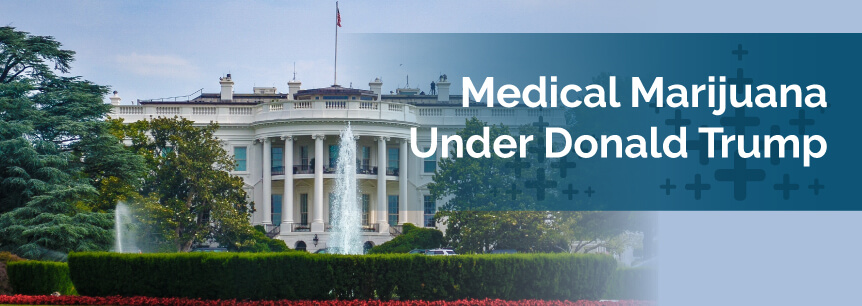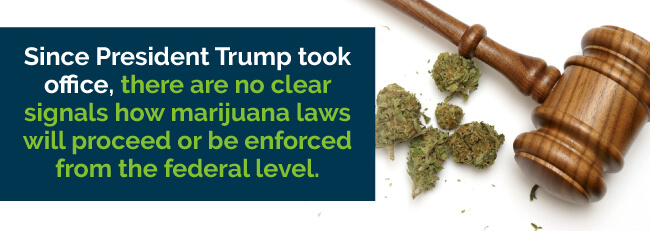
Donald Trump’s candidacy for president ushered in a new era in American politics. He seemed to do everything wrong along the campaign trail, and yet he gathered momentum until he was elected the 45th president of the United States. While some celebrate and others mourn this political anomaly, the country continues to operate on an uneven keel while our leader adjusts to life as an elected official for the first time.
The politics of marijuana was already strange before Donald Trump came on the scene. A substance that is banned by federal law is now legal, in some capacity, in 28 states. Marijuana regulations certainly stretch the boundaries of states’ rights, but the FDA so far refuses to cave to what is becoming a popular position.
Although several states recognize the health benefits of cannabis when used to relieve the symptoms of debilitating conditions, the FDA maintains its ban. Schedule I drugs are those considered extremely dangerous, among them heroin and meth. The FDA classified marijuana as a Schedule I substance decades ago, and despite more recent reevaluation, continues to see it that way.
In the strictest sense of the law, marijuana in any form and used for any purpose is not legal. It is not legal, according to federal law, to grow, use, possess or distribute cannabis or any product containing cannabis. However, in certain states, there is a loophole for patients suffering from debilitating conditions who can find some relief using cannabis products.
In 28 states, it is legal to use marijuana for medical purposes. Most of these states have set up strict regulations to monitor the use of cannabis products by patients and the recommendation of those products by doctors. Most state medical marijuana programs work this way:
Most states that administer a medical marijuana program keep track of the patients, doctors and dispensaries participating in the program. They record what conditions are being treated and with what products, in some cases to develop a body of evidence for the efficacy of the treatments.
The relationships between doctors, patients and dispensaries are also tracked. A central database ensures there is no abuse of the program. Doctors’ recommendations for patients are recorded in the database and accessible to dispensaries. A patient is allowed to buy products from one dispensary that verifies the patient’s information with the database.
Most of the medical marijuana states issue cards to registered patients, so they can prove their medical need for cannabis products. This is where the federal law makes the system a little complicated. A card-carrying medical marijuana patient who is not in violation of state marijuana regulations can be arrested under federal law for possession.
As long as the discrepancy between state and federal law exists, a state-issued medical marijuana card is not a license to break the law. Some states even warn patients their marijuana card is not a get-out-of-jail-free pass. The biggest issue is in transporting medical marijuana home from the dispensary. States are working on ways to make this safer for patients.
In some states, dispensaries are licensed to operate delivery services. This keeps patients off the street with their stash and focuses all of the security concerns on a few delivery drivers. Other states implemented marijuana transportation regulations to help patients avoid arousing suspicion or creating dangerous situations on the roads. Patients are required to lock the marijuana in their trunks and are prohibited from consuming any cannabis products while in their vehicle.

Under the Obama administration, it was clear that federal law regarding marijuana possession would not be enforced against patients who were making use of their state’s medical marijuana program. Since President Trump took office, there are no clear signals how marijuana laws will proceed or be enforced from the federal level.
President Trump’s campaign was particularly silent on marijuana laws. He was very vocal about laws in general, though. On the campaign trail, Trump was particularly fond of the phrase “law and order” and promised to be a tough president.
Specifically with respect to immigration, President Trump holds true to his campaign promise of enforcing the laws of the land. He nominated a Supreme Court justice who is an experienced judge and defender of the law. Justice Gorsuch, during his confirmation hearings, made it clear that he saw his job as a judge to interpret the laws as they are written despite his own feelings or prejudice.
President Trump’s choice for Attorney General, Jeff Sessions, could also affect a change in the movement across the country toward legalizing marijuana. In the past, Sessions has been outspoken against legalizing marijuana. He seems to favor marijuana prohibition and espouses age-old stereotypes about drug use, among other things.
There was an amendment to a spending bill passed in 2014 that is still enforced. It restricted the federal government from spending money to actively oppose state-run medical marijuana programs. If this rule remains in place, states may be allowed to continue managing their own marijuana programs. It does not cover recreational marijuana use, however.
President Trump is also, first and foremost, a businessman. He favors free trade and might be able to see the benefit of a regulated cannabis industry. As it grows, the industry provides jobs and revenue to states and municipalities. Although President Trump does not use alcohol or drugs, he can certainly see the financial benefit of the alcohol industry. Hopefully, he will understand that the cannabis industry could present even greater benefits to the country.
No Information on MarijuanaDoctors.Com should be used to diagnose, treat, prevent or cure any disease or condition. You can view our Full Disclaimer here.